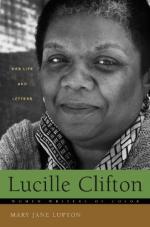|
This section contains 440 words (approx. 2 pages at 300 words per page) |

|
SOURCE: A review of Good Woman: Poems and a Memoir 1969-1980 and Next: New Poems, in World Literature Today, Vol. 62, No. 3, Summer, 1988, p. 459.
Earnshaw praises Clifton's constancy in speaking victoriously for downtrodden people.
Like Nelly Sachs, whose O the Chimneys won a Nobel Prize for the German poet, Lucille Clifton arose from dreadful national experience to speak for all downtrodden people. Unlike Sachs, however, Clifton can speak victoriously about the survival through slavery of her family, although "even the good parts was awful." In Generations, a collection of autobiographical pieces published by Random House in 1976 and reprinted now in good woman, Clifton traces her lineage to her great-great-grandmother Mammy Ca'line, "born free in Afrika in 1822 died free in America in 1910." This absorbing biography makes her aware that slavery was a temporary experience; the power of Dahomey women goes on to her children's children's generation.
Clifton gives us details...
|
This section contains 440 words (approx. 2 pages at 300 words per page) |

|


